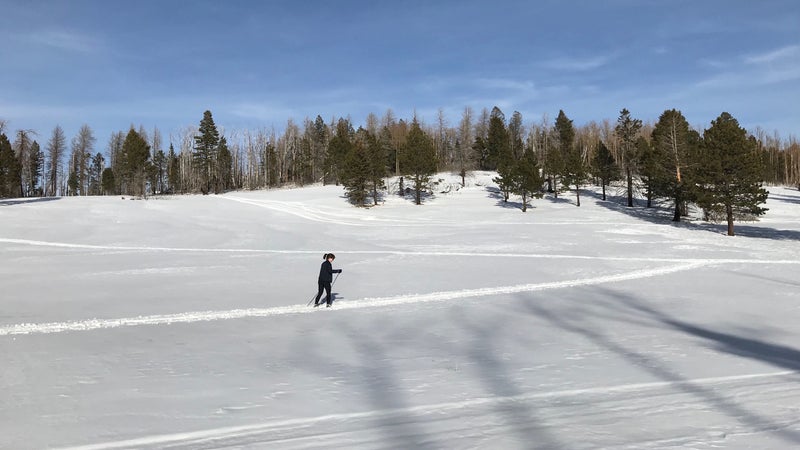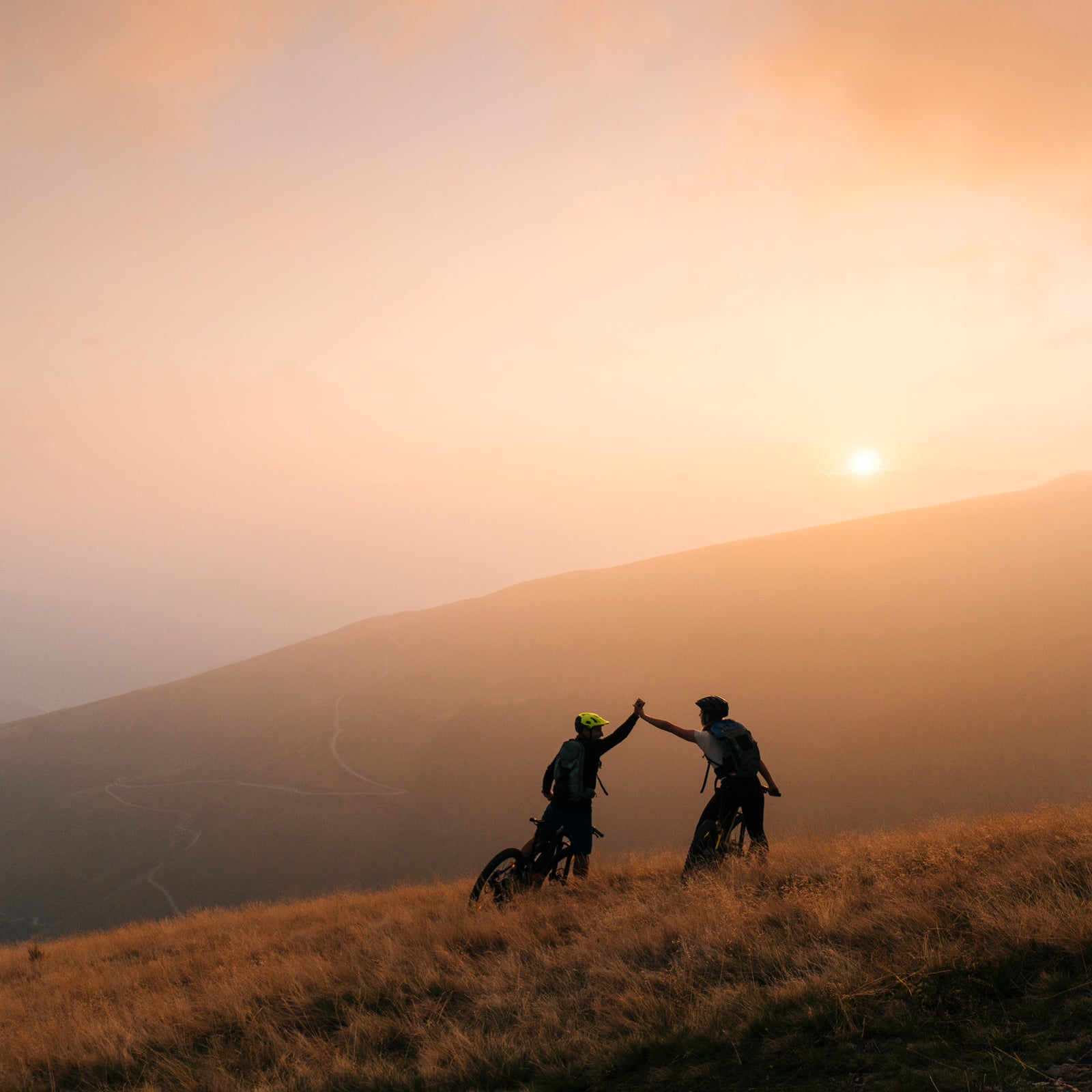ÔÇťI love that you work at ║┌┴¤│ď╣¤═° but arenÔÇÖt, you know, ║┌┴¤│ď╣¤═°-y,ÔÇŁ an acquaintance who shall not be named told me earlier this year. I get variations of this comment a lot.╠řI live and work among people whoÔÇÖve been on ski patrol, undertaken weeks-long backpacking trips, and handled Class V rapids without any help. I have done none of those things, but recently, I was nearly killed by a ski lift (my backpack got stuck,╠řand the emergency-stop bar malfunctionedÔÇönot my fault!). I also barfed in a lift line (motion sicknessÔÇödriving and skiingÔÇÖs fault!) and cried on a ridge because I was too paralyzed by fear to ski off a cornice (my fault, from all angles!). And skiing is only one of the sports I started learning at age 22 when I moved to New Mexico to work for this magazine.
In the five years since, IÔÇÖve also learned how to climb, backpack, and trail run without hurting myself, and IÔÇÖve taken some╠řbaby steps in biking and paddling. To me these sports are fine arts, each with their own special world of gear, rules, and lingo. Relatedly, they are also crash courses in trying to gracefully feel╠řstupid in front of other people.
The outdoorsy types in my life have been kind to me as IÔÇÖve learned the ropes,╠řbut it does bother me a little when I mess up╠řor canÔÇÖt hang╠řor otherwise demonstrate that I am not one of them. When people╠řtalk about being outdoorsy, thereÔÇÖs a lot to unpack. Everyone sits somewhere on the active spectrum and has their own reasons for being there, with personal preferences and socioeconomic and health-related considerations all wrapped up in it. But what IÔÇÖve learned from my own experience is that it takes finesse to be a good beginner in the land of hardcore athletes.
When people╠řtalk about being outdoorsy, thereÔÇÖs a lot to unpack.
It turns out that at ║┌┴¤│ď╣¤═°,╠řsaying you ran cross-country pretty well in high school is like sharing your SAT score any time after graduating high school: irrelevant enough to get an awkward look. IÔÇÖve spent most of my time at this magazine╠řforensically picking apart all the reasons I didnÔÇÖt arrive here a skilled outdoorswoman. For one thing, give me a break, I grew up in Florida. This is an imperfect but decent excuse for not knowing anything about mountains and the activities you can do on one. Florida made me appreciate nature, but in a slow and aimless manner, like floating on my back in the ocean for as long as I wanted╠řor watching a lizard die on a muggy day after my dog sliced its throat open by accident. I was the only unathletic one of three siblings growing up, with not enough hand-eye coordination for even kindergarten ballet. But I was bookish! And you know those kids who devour Into Thin Air and pluckily find their way onto a mountaineering expedition later in life? Also not me!
Still, by the end of college, when I got my job at ║┌┴¤│ď╣¤═°, I certainly had the most outdoor cred of my family: I liked running and had gone on quite a few camping trips╠ř(with borrowed gear). I love hearing how my friendsÔÇÖ early exposure to the outdoors built the foundation for their current, supercool adventure lifestyles: maybe they scaled a grand peak as they were toted╠řin a BabyBj├Ârn or took on a blue-square ski run╠řwhile attached╠řto their parent with╠řa cute little╠řleash. But adventure sports are not an inherited skill for me. My mom and dad grew up in Chicago and Saint╠řLouis, respectively, where╠řrock climbing and skiing were not really a thing. My dad also has a chronic health condition and╠řstarted losing the use of his legs when I was six. We just were not the family that did big hikes together. I had a wonderful childhood,╠řbut IÔÇÖve found that family members induct many people into favorite sports earlyÔÇöit helps to start before you can even walk, right?╠ř

Are you exhausted listening to my excuses for not doing sports? I am, too.╠řItÔÇÖs mostly a coping mechanism.╠řIÔÇÖd rather believe that all the accomplished outdoorspeople just had some lifelong advantage over me, so╠řI donÔÇÖt have to╠řtake responsibility for the many times I wasnÔÇÖt resourceful enough to do cooler things outdoors. I brace for impact when I ask good skiers how long theyÔÇÖve been at it, because what if they also didnÔÇÖt learn to ski before 23 but simply╠řpicked it up faster?
This may come as╠řa shock, but I have not yet picked up╠řa sport quickly. I always start in ÔÇťjust happy to be hereÔÇŁ mode,╠řlike a lilÔÇÖ╠řgolden retriever on skis, desperate for instruction, encouragement, and snacks. I expect nothing, IÔÇÖm here to have fun! As I get more confident, it becomes kind of insidious, because now I expect myself to keep up and will absolutely hurt my own feelings if I donÔÇÖt. Someone once asked if IÔÇÖd be OK on a bumpy blue run, and I almost cried into my goggles:╠řDo I look like a beginner? (It took me a while to get down the bumpy blue run, fine.)╠řItÔÇÖs not really about competitiveness; it just seems like╠řif you love doing something and do it enough times, you get to╠řgo faster or achieve harder things. This is how progress and goals work, no?
I try to remind myself that learning to hang on to a wall or zooming down a mountain for the first time in my twenties╠řis something to savor, not a personal failure.
Being a beginner has revealed this key flaw in my thinking: I both desire and assume a linear relationship between loving a sport and getting good enough at it to fit in.╠řNot to mention that╠řsports like skiing and climbing presented me with activities where╠řeveryone looked cool just by doing it well. I want to look cool! Not attaining that has sometimes brought out the ugly side of my ego. I get bored with being the slowest and the least impressiveÔÇöI still have fun, but itÔÇÖd be more fun if people paid attention to me.╠ř
Instead of beating myself up, IÔÇÖm trying to get to know myself and be a little more encouraging. IÔÇÖm learning the distinction between self-deprecation (much easier than showing people how badly I want to get better) and productive levity. Once, staring down a tree-filled run and knowing IÔÇÖd need to whip out some knee-destroying pizzas, I just╠řrenamed it the Florida Snowplow, which helped╠řme commit to each turn. IÔÇÖm trying to treat my personal history of the outdoors with affectionÔÇöitÔÇÖs part of the reason I canÔÇÖt mountain bike or navigate for shit, but itÔÇÖs also why I have an appreciation for reptiles and bugs that really enhances nature outings.╠řAnd I try to remind myself that learning to hang on to a wall or zooming down a mountain for the first time in my twenties╠řis something to savor, not a personal failure.
One of the best parts of all this is that╠řforcing others to hang out with you to╠řteach you╠řis not just encouraged╠řbut pretty necessary. The thing about knowing lots of hardcore athletes is that the really skilled people are usually the ones who most want to help beginners love that sport. I have a theory that╠řthe progression of ego is shaped like a plateau: it rises with skill at first, peaks at the intermediate stage, and then starts descending as you╠řget╠řbetter, so much better that your╠řaccomplishments precede you╠řor just speak for themselves. Or maybe, itÔÇÖs dawned on me, skilled athletes are╠řso╠řgenerous to beginners like me because theyÔÇÖre obsessed with their sportÔÇöthey want to do it all the time and pass along their obsession╠řjust because they love it so much. On bad days and beginner-to-intermediate-angst days, I try to be more like those people.


